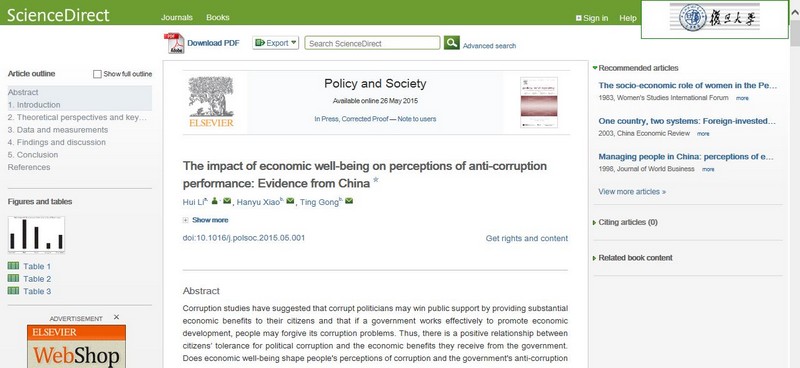发布时间:2015-06-05浏览次数:

我院李辉副教授与香港城市大学公婷教授、肖汉宇博士在社会科学引文索引(SSCI)来源期刊《政策与社会》(Policy and Society)上发表了题为《经济发展对反腐败绩效认知的影响:来自中国的证据》(The impact of economic well-being on perceptions of anti-corruption performance: Evidence from China)的论文。

在腐败研究中,有些研究表明在一些发展中国家,即便是非常腐败的政客依然可以通过给于民众足够的经济上的好处来赢得支持。根据这一理论,如果政府在促进经济发展上的绩效足够好,那么民众有可能在一定程度上宽恕政府的腐败行为。本文则试图在中国对这一理论的微观机制进行一些验证,我们的研究问题为:个体的经济状况是否会影响民众对政府反腐败绩效的评价?如果有影响的话,是何种影响,影响的程度又有多大?为了回答这一问题,我们使用了2011年的一项全国调查数据,在对资料进行统计分析后发现,民众的客观经济状况对其的反腐败绩效评价没有显著影响,但是主观经济状况却相反,可以显著改善民众对地方政府反腐败绩效的评价。
文章信息:Hui, Li, Hanyu Xiao & Ting Gong. 2015. The impact of economic well-being on perceptions of anti-corruption performance: Evidence from China,Policy and Society(2015),http://dx.doi.org/10.1016/j.polsoc.2015.05.001.
The impact of economic well-being on perceptions of anti-corruption performance: Evidence from China
Abstract
Corruption studies have suggested that corrupt politicians may win public support by providing substantial economic benefits to their citizens and that if a government works effectively to promote economic development, people may forgive its corruption problems. Thus, there is a positive relationship between citizens’ tolerance for political corruption and the economic benefits they receive from the government. Does economic well-being shape people’s perceptions of corruption and the government’s anti- corruption performance? If so, how and to what extent? To address the questions, this study draws on empirical data from a nationwide survey conducted in China in 2011. China makes an ideal case for the study because, although its unprecedented economic growth significantly improved people’s living standards, the country has continued to suffer from rampant corruption. China’s case illustrates the intricate relationships between the rise of economic status—perceived or actual—and attitudes toward the government’s anti-corruption efforts among citizens.